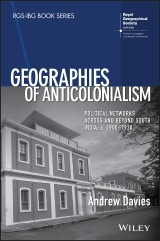Details
Geographies of Anticolonialism
Political Networks Across and Beyond South India, c. 1900-1930RGS-IBG Book Series 1. Aufl.
|
25,99 € |
|
| Verlag: | Wiley |
| Format: | EPUB |
| Veröffentl.: | 09.10.2019 |
| ISBN/EAN: | 9781119381563 |
| Sprache: | englisch |
| Anzahl Seiten: | 184 |
DRM-geschütztes eBook, Sie benötigen z.B. Adobe Digital Editions und eine Adobe ID zum Lesen.
Beschreibungen
<p>A fresh approach to scholarship on the diverse nature of Indian anticolonial processes.</p> <ul> <li>Brings together a varied selection of literature to explore Indian anticolonialism in new ways</li> <li>Offers a different perspective to geographers seeking to understand political resistance to colonialism</li> <li>Addresses contemporary studies that argue nationalism was joined by other political processes, such as revolutionary and anarchist ideologies, to shape the Indian independence movement</li> <li>Includes a focus on a specific anticolonial group, the “Pondicherry Gang,” and investigates their significant impact which went beyond South India</li> <li>Helps readers understand the diverse nature of anticolonialism, which in turn prompts thinking about the various geographies produced through anticolonial activity</li> </ul>
<p>Series Editor’s Preface vi</p> <p>Acknowledgements vii</p> <p>Author’s Note ix</p> <p>1 Post? Anti? De? Why Anticolonialism Still Matters 1</p> <p>2 Theorising Anticolonial Space 19</p> <p>3 South India and Anticolonialism: The Minor Politics of Anticolonialism in a Historiographical ‘Backwater’ 40</p> <p>4 Appropriating Modernity and Development to Contest Colonialism: The <i>Swadeshi </i>Movement in South India and the <i>Swadeshi </i>Steam Navigation Company 68</p> <p>5 Spacing and Placing Anticolonialism: Pondicherry as a Hub of Radical Nationalist Anticolonial Thought 90</p> <p>6 Envisioning a Spiritual and Cosmopolitan Decolonial Future? Sri Aurobindo’s ‘Non-political’ Anticolonialism 115</p> <p>7 The ‘International’ and Anarchist Life of M.P.T. Acharya 137</p> <p>8 Conclusion: The Necessity of a Geographical Anticolonial Thought, or Why Anticolonialism Still Matters 161</p> <p>Bibliography 166</p> <p>Index 169</p>
‘Theoretically sophisticated and empirically rich, <i>Geographies of Anticolonialism</i> takes a spatial approach to the study of anticolonialism. Through an exploration of a cluster of little-known but fascinating figures situated in the French South Indian enclave of Pondicherry – poet Subramania Bharati, nationalist mobilizer V.O. Chidambaram Pillai, international anarchist M.P.T. Acharya and spiritual nationalist Aurobindo Ghosh – Andrew Davies makes a major contribution to the study of Indian freedom struggle as well as to global anticolonial thought.’ <br /><b>A.R. Venkatachalapathy, Professor</b><b> of History, Madras Institute of Development Studies, India<br /><br /></b>‘In this wide-ranging, engagingly written and provocative historical geography of anticolonialism, Davies threads together analyses of sea networks, land hubs, politico-spiritual utopias and anarchist internationalism, which return to but are not confined within South India. Anticolonialism here broadens the scope of the de-colonial and adds ideological and material politics to the postcolonial, brilliantly contesting the territorial and epistemological boundaries of colonial geography.’<br /><b>Stephen Legg, Professor of Geography, University of Nottingham, UK<br /><br /></b> <p>‘<i>Geographies of Anticolonialism</i> delves into a radical culture situated within and through the South Indian coastal city of Pondicherry. The stories and individual biographies (the book is centred around a ‘gang’ of four key anticolonial figures) that emerge are absorbing in themselves, from the alternative shipping routes of the Swadeshi Steam Navigation Company (SSNCo) to the radical publishing networks associated with the writings of Subramania Bharati, and speak to much wider debates around resistance and spatial politics.’<br /><b>Paul Griffin, Northumbria University</b> (<i>Singapore Journal of Tropical Geography</i>)</p> <b><br /></b>
<p><b>Dr Andrew Davies</b> is a Geographer and Senior Lecturer in Human Geography at the University of Liverpool, UK. His work focuses on past and present anticolonialism, from the Indian independence movement to the politics of Tibetan support organizations. He has helped communities across the UK understand the contested and problematic legacies of colonialism in the current day. He is co-editor of <i>10 Years on the Parish: The Autobiography and Letters of George Garrett.</i></p>
<p><i>Geographies of Anticolonialism </i>brings together a varied selection of historical sources and literature to explore Indian anticolonialism in new ways. Anticolonialism, an often overlooked concept in geography, can be defined as internal and external resistance to the practices and by-products of colonial rule, such as racism, militarism, resource exploitation, and land dispossession. Linked to, but different from post- and decolonial approaches, anticolonial geographies are explicitly political in nature - offering a different perspective to geographers seeking to understand political resistance to colonialism.</p> <p>The author addresses contemporary studies that argue nationalism was joined by other political processes, such as revolutionary and anarchist ideologies, to shape the Indian independence movement. A focus on a specific anticolonial group, the “Pondicherry Gang,” investigates their significant impact which exceeded their small numbers and short period of activity. Operating in the south of India, an underrepresented area of study when compared to Bengal and the Punjab, members of the Pondicherry resistance became spiritual gurus, reinvigorated the Tamil language, and conducted the only political assassination in the region. In examining such activities, <i>Geographies of Anticolonialism </i>helps readers understand the diverse nature of anticolonialism, which in turn prompts thinking about the various geographies produced through anticolonial activity.</p>
‘Theoretically sophisticated and empirically rich, <i>Geographies of Anticolonialism</i> takes a spatial approach to the study of anticolonialism. Through an exploration of a cluster of little-known but fascinating figures situated in the French South Indian enclave of Pondicherry – poet Subramania Bharati, nationalist mobilizer V.O. Chidambaram Pillai, international anarchist M.P.T. Acharya and spiritual nationalist Aurobindo Ghosh – Andrew Davies makes a major contribution to the study of Indian freedom struggle as well as to global anticolonial thought.’ <br /><b>A.R. Venkatachalapathy, Professor</b><b> of History, Madras Institute of Development Studies, India<br /><br /></b>‘In this wide-ranging, engagingly written and provocative historical geography of anticolonialism, Davies threads together analyses of sea networks, land hubs, politico-spiritual utopias and anarchist internationalism, which return to but are not confined within South India. Anticolonialism here broadens the scope of the de-colonial and adds ideological and material politics to the postcolonial, brilliantly contesting the territorial and epistemological boundaries of colonial geography.’<br /><b>Stephen Legg, Professor of Geography, University of Nottingham, UK</b>
Diese Produkte könnten Sie auch interessieren:

Observing Systems for Atmospheric Composition

von: Guido Visconti, Pietro Di Carlo, W. Brune, M. Schoeberl, Andreas Wahner

149,79 €
















